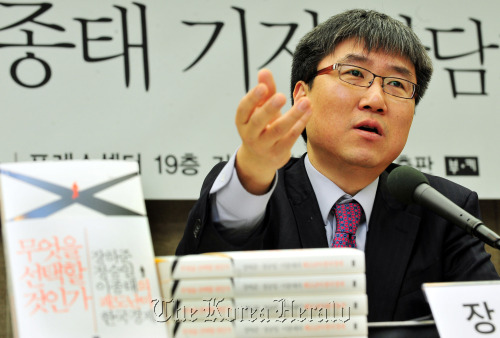Leading economist to publish new book on welfare state
By Claire LeePublished : March 19, 2012 - 17:05
Universal welfare, as well as more regulations on the free market and chaebol reform are crucial in contemporary Korean economy, according to Chang Ha-joon, one of the leading heterodox economists in Korea. He spoke at a news conference held Monday to promote his upcoming book.
The new book, “What to Choose: Cutting the Gordian Knot -- An Analysis of the Korean Economy,” co-authored by Chang, Lee Jong-tae and Jeong Seung-il, is an extension of the trio’s 2005 book “Cutting the Gordian Knot -- An Analysis of the Korean Economy.”
“When we wrote the book back in 2005, many thought our vision on the welfare state was simply absurd,” said Chang. “Things are different now. Even the conservative Saenuri Party talks about its own plans for welfare. But what many still don’t know is that welfare is inseparable from many other economic issues, such as free market regulations and chaebol reforms.”
Jeong pointed out that the government’s recent talks about chaebol reform do not include any plans about their taxes.
“Who pays the most taxes in this country? It’s chaebol,” Jeong told reporters. “And the matter of taxation is the most important thing in a welfare state. Chaebol reforms and tax matters must be discussed together.”
The new book, “What to Choose: Cutting the Gordian Knot -- An Analysis of the Korean Economy,” co-authored by Chang, Lee Jong-tae and Jeong Seung-il, is an extension of the trio’s 2005 book “Cutting the Gordian Knot -- An Analysis of the Korean Economy.”
“When we wrote the book back in 2005, many thought our vision on the welfare state was simply absurd,” said Chang. “Things are different now. Even the conservative Saenuri Party talks about its own plans for welfare. But what many still don’t know is that welfare is inseparable from many other economic issues, such as free market regulations and chaebol reforms.”
Jeong pointed out that the government’s recent talks about chaebol reform do not include any plans about their taxes.
“Who pays the most taxes in this country? It’s chaebol,” Jeong told reporters. “And the matter of taxation is the most important thing in a welfare state. Chaebol reforms and tax matters must be discussed together.”

In the book, Chang says the term “liberalism” is very often misinterpreted as its opposite by Koreans, stressing that it is in fact inseparable from the principle of free markets.
“There is this fantasy about liberalism in Korea, that liberalism is good although neoliberalism may be bad,” he writes.
“Because of the word ‘liberal,’ many Koreans mistake the term ‘liberalism’ for what it is not. Very often we hear people say they are a ‘progressive liberal,’ or a ‘practical liberal’ when they are in fact calling for mostly neoliberal policies.”
Chang also pointed out that both the ruling and opposition parties have spread wrong ideas about welfare, manipulating the public for their political gains.
“The whole ‘free’ school lunch drama,” Chang said, “The meals, in fact, are not free. They are financed by the taxes paid by the kids’ parents. And to those who said something like, ‘Why should Samsung Electronics chairman Lee Kun-hee’s grandson get a free meal (when his parents are more than capable of providing him food everyday), well, he isn’t getting a free meal either. His grandfather pays taxes that are at least five times higher than ordinary people.”
The three authors shared their vision of Korea as a strong welfare state in the next 30 years, almost to the level of Sweden. Chang stresses that the U.S. idea of welfare as selective assistance to the poor is not what he is hoping to see in Korea.
“In order to establish ourselves as a strong welfare state, we need the joint decision of our politicians and citizens, especially those of the middle class,” he writes.
“We need to form a new perception on tax and welfare expenses. That tax isn’t something that we are wasting, and that welfare expenses are for the common good, not a free service (for a specific group in the society.)”
The book will hit local bookstores on Friday.
By Claire Lee (dyc@heraldcorp.com)







![[Graphic News] Number of coffee franchises in S. Korea rises 13%](http://res.heraldm.com/phpwas/restmb_idxmake.php?idx=644&simg=/content/image/2024/05/02/20240502050817_0.gif&u=)

![[Robert J. Fouser] AI changes rationale for learning languages](http://res.heraldm.com/phpwas/restmb_idxmake.php?idx=644&simg=/content/image/2024/05/02/20240502050811_0.jpg&u=)







![[Eye Interview] 'If you live to 100, you might as well be happy,' says 88-year-old bestselling essayist](http://res.heraldm.com/phpwas/restmb_idxmake.php?idx=652&simg=/content/image/2024/05/03/20240503050674_0.jpg&u=)
